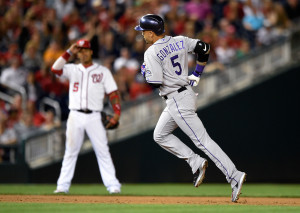WASHINGTON — On Wednesday night, the Washington Nationals will square off in a rubber match with the Los Angeles Dodgers inexplicably sitting in second place in the worst division in baseball, a division they should be winning by 10 games. The day marks the 500th since manager Matt Williams took the reins for his first game, which is a large enough sample to acknowledge what has become painfully obvious: He’s not equipped to manage a team with championship aspirations.
The timing of it all got me thinking about the 2009 romantic comedy “500 Days of Summer,” in which the protagonist is forced to stop looking at his relationship through faulty, rose-colored glasses, and instead confront the reality of the situation. Sure, Washington is 154-120 during Williams’ tenure, a healthy .562 winning percentage. But all they have to show for it is a first-round playoff exit followed by potentially the most disappointing season in baseball should they fail to overtake the New York Mets and miss the postseason this year.
Last week, MASN held an ill-timed #AskMatt Twitter campaign, where fans were encouraged to pose queries to the embattled manager. The results were predictable, but also shed a light on how deeply flawed and restrictive Williams’ philosophies on game management have continued to be, even nearly 275 games into his tenure.
While Williams is best known for his bullpen blunders in Game 4 of the 2014 NLDS, the roots were planted months earlier. I attended an April Nats-Angels game last year with a friend of mine who is an Angels fan. With right-hander Tanner Roark on the hill, we wondered aloud from the sixth inning on, between beers and tacos, when Mike Scoscia would fire the lone left-handed bullet with any pop on his bench, Raul Ibanez.
As the eighth inning rolled along, the Nationals ahead 1-0, Williams turned to Tyler Clippard, who allowed two of the first three batters to reach, one by error and another on a single. Clippard got the second out, then yielded a game-tying single to Erick Aybar. As his pitch count mounted, all three lefty relievers on Washington’s roster at the time — Jerry Blevins, Xavier Cedeno and Ross Detwiler — sat still on the bullpen benches, not one stirring as the game threatened to spiral out of hand.
Clippard then walked Chris Iannetta to load the bases and bring up the nine spot in the order, the painfully obvious place where Ibanez would be used, without a lefty ready to face him. The aging slugger promptly unloaded the bases with a three-run double; the Angels won the game 4-2.
This, of course, turned out to be anything but an isolated incident. Time and time again relievers have been constricted to preconceived roles instead of being used where they are most needed and in situations where they have proven to be most effective. And a year-and-a-half after that first managerial disaster, we were witness to the exact same inside-the-box thinking this weekend against the Colorado Rockies.
Drew Storen has easily been, over the course of the year, the best reliever on the team. So even after loading the bases with two outs in the eighth inning Friday, the Nats ahead 4-1, leaving him in to get the final out of the inning seems like a reasonable decision. In a vacuum, you want your best reliever on the mound in the highest leverage situation of the game.

But Carlos Gonzalez doesn’t exist in a vacuum. He exists in the real world, where he mashes the living hell out of right-handed pitching, to the tune of a .318/.376/1.026 line with 24 of his 26 home runs this year. Against lefties, he’s far less than merely mortal, slashing just .170/.218/.245, an OPS+ of 32. He has three extra-base hits in 102 plate appearances with 27 strikeouts.
It doesn’t matter how good Storen has been. It matters how bad Gonzalez has been against lefties. The only reasonable conclusion when looking at those splits — which are printed in the stat packs dropped on the manager’s desk every morning — is that a left-handed pitcher needed to be in the game. There wasn’t even anyone warming in the home bullpen as Gonzalez mashed a grand slam off its back wall, the final scores of a 5-4 Rockies victory.
The very next day, as if karmically dictated by the baseball gods themselves, Gonzalez hit not one, but two more home runs against the man that may be the very best right-handed pitcher in baseball, Max Scherzer (for good measure, he hit another off Jon Niese in New York Monday night). It was a figurative, open-palmed slap from above to the side of Williams’ head to drive the point home: “Do you get it now?”
The problem is, Williams doesn’t. Better than a season-and-a-half into his tenure, with teachable moments mounting all around him, he still doesn’t grasp the difference between devising a strategy and actually managing a team. The strategy is already in place. The managing isn’t happening.
You shouldn’t have an “eighth inning guy,” because the eighth inning is an abstract concept, a set of three outs the nature of which changes every night based on the part of the lineup due to bat, the bench players still remaining, and the bullpen options available to you given the way this game and the one or two preceding it has already progressed. Individual situations, on the other hand, call for particular moves to be made in order to improve the chances of the desired outcome. If you bring in a lefty to face Carlos Gonzalez and he hits him anyway, that’s when you tip your cap.
When Davey Johnson made the mistake of using Edwin Jackson in the 7th inning of Game 5 of the 2012 NLDS, it wasn’t on a fanciful whim out of thin air. He’d done the very same thing the night before, calling on Jordan Zimmermann for what is still, to date, the only relief appearance of his Major League career, in a 1-1 game when he needed three outs.
The move was inspired. Zimmermann touched the high 90s on the radar gun as he struck out the side, igniting the Nationals Park crowd. Johnson’s mistake was trying the same trick with a pitcher who historically needed an inning to get locked in before he became comfortable in a role that didn’t suit him. But that doesn’t take away from the idea the day prior, the one that helped put the team in position to play a Game 5 in the first place.
Williams’ inability to think dynamically extends to his lineup as well, where he has batted Michael Taylor and his .279 on-base percentage leadoff 25 times. As I mentioned last week, the Nationals are 10-15 in those games, compared to a 31-26 mark when Taylor starts and bats in another spot in the lineup. It shouldn’t take someone to explain to a manager that simply because your leadoff-hitting center fielder goes down with an injury that you don’t have to bat the replacement center fielder in the leadoff spot.
Sure, the Nationals beat the Dodgers 8-3 Monday night. But you don’t learn about a relationship when everything is happy. Those are the easy times. It’s when things get tense, when real decisions have to be made, that your true character is revealed.
Reality does not always live up to our expectations. Sure, this relationship seemed great when it started, just like the one in the movie — Mike Rizzo and Williams met at the office, when they worked together in Arizona. It seemed like a perfect match until it became apparent that this team and this manager are at desperately different points on their development curves, one looking for a serious commitment while the other is still growing up. They just aren’t right for each other. In order to move forward, both sides need to accept that fact.
And if they do, just like in the movie, maybe the Nationals can finally find a happier, more successful relationship with Autumn.






